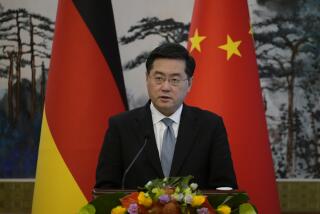China Backs Plan for Cambodia Peacekeeping Force
- Share via
BEIJING — The Chinese government supports proposals that an international peacekeeping force and an international supervision committee be sent to Cambodia to oversee a political settlement there, Chinese leader Zhao Ziyang said Friday.
Zhao, general secretary of the Communist Party of China, made the statement at a meeting with visiting Japanese Prime Minister Noboru Takeshita, the official New China News Agency reported.
Japan last month announced its willingness to contribute money for such an international peacekeeping force and to contribute personnel to an international team to supervise elections if a political settlement is reached between the Vietnamese-installed government in Phnom Penh and a three-faction coalition resistance.
Zhao’s comments set the stage for the arrival here today of Soviet Deputy Foreign Minister Igor A. Rogachev for talks on Cambodia. These talks could pave the way for peace in Cambodia, normalization of Sino-Soviet relations and a Sino-Soviet summit conference.
Zhao told Takeshita that resolution of the Cambodia conflict hinges primarily on the withdrawal of Vietnamese troops. He also said, according to the news agency, that a four-party coalition government should be set up incorporating all the Cambodian factions on both sides of the conflict and headed by Prince Norodom Sihanouk, a former ruler who is now a resistance leader.
Takeshita, according to a Japanese official who spoke on condition that he not be identified by name, told Zhao that Japan agrees with China’s policy on Cambodia and will see what it can do to encourage creation of a four-party coalition government.
The United States has publicly expressed interest in the formation of an international peacekeeping force in Cambodia. One purpose of such a force would be to try to ensure that the Khmer Rouge, which conducted a reign of terror killing more than 1 million people in Cambodia from 1975 through 1978 and is now the most powerful resistance faction, does not return to power.
The Khmer Rouge was ousted by a Vietnamese invasion in 1978. Vietnam still has about 100,000 soldiers in Cambodia but has promised to withdraw them by 1990.
China has given both Sihanouk and the Khmer Rouge materiel and political support for more than a decade, while the Soviet Union has supported Vietnam and the current Phnom Penh government.
Recently China has emphasized that the Cambodian issue is the major obstacle to normalizing Sino-Soviet relations, which have been strained since the early 1960s. Premier Li Peng reiterated this point Tuesday in a meeting with Takeshita.
China also has stressed that it does not favor a resumption of absolute power by the Khmer Rouge, but that it is even more important that the present regime not be allowed to retain power exclusively.
“The international community is understandably concerned about how to prevent the Khmer Rouge from returning to power in Cambodia after Vietnam pulls out its troops,” the news agency quoted Zhao as telling Takeshita. “But the more immediate danger is that Vietnam is trying by every possible means to legalize the puppet regime in Cambodia.”
Zhao proposed that the armed forces of all three resistance factions and the Phnom Penh government be disbanded and replaced by a national army composed in equal measure of forces of the four parties, the news agency reported. Zhao said this would help prevent conflicts and ensure the smooth conduct of a general election.
Takeshita’s visit marks a high point in cooperative and friendly relations between Japan and China, both in the international political arena and in terms of bilateral economic and cultural ties.
This growing friendship was strongly endorsed Friday by Deng Xiaoping, China’s paramount leader, who in the past has sometimes voiced sharp criticism of Japan.
“I am someone who is very enthusiastic about friendly cooperation between China and Japan,” Deng told Takeshita.
More to Read
Sign up for Essential California
The most important California stories and recommendations in your inbox every morning.
You may occasionally receive promotional content from the Los Angeles Times.













